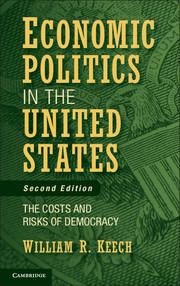Book contents
- Frontmatter
- Contents
- List of Figures and Tables
- Preface to the Second Edition
- Preface to the First Edition
- Part One Introduction
- Part Two Models of Macroeconomic Politics in a Democracy
- Part Three The Sources and Authority of Macroeconomic Goals
- Part Four Institutions and Processes
- Part Five Conclusion
- 10 The Costs and Risks of Democracy
- References
- Index
10 - The Costs and Risks of Democracy
Published online by Cambridge University Press: 05 June 2014
- Frontmatter
- Contents
- List of Figures and Tables
- Preface to the Second Edition
- Preface to the First Edition
- Part One Introduction
- Part Two Models of Macroeconomic Politics in a Democracy
- Part Three The Sources and Authority of Macroeconomic Goals
- Part Four Institutions and Processes
- Part Five Conclusion
- 10 The Costs and Risks of Democracy
- References
- Index
Summary
The world’s richest and freest countries are democracies. More than any other political system, democracies have the capacity to correct themselves. Democracy is basically about procedures, in contrast to political systems defined by eligible rulers, such as monarchs, military dictators, or other types of authoritarian rulers. The central procedural feature of modern democracy is elections, which provide the opportunity to replace the incumbents with alternatives. This is Riker’s (1982) minimalist liberal democracy, the opportunity to throw the rascals out, with no claims made about who or what will replace a rejected government.
Democracies can perform well or badly, The first edition of this book suggested that democracy in the United States was doing rather well when measured by its macroeconomic performance, even though the book was guided and informed by models and theories that emphasized that politicians might be motivated by careerist and opportunistic goals, rather than by a desire to deliver good policy and good performance for its own sake. The previous version found little evidence of policy or performance that was systematically inferior because of opportunistic behavior.
This version has emphasized different problems: unintended consequences, moral hazard, and time-consistency. It has emphasized suspicion and distrust between the major parties. The first edition interpreted voting behavior in the United States as not systematically demanding inferior or suboptimal policy. This may still be true, but the context has changed so that elections may no longer be as constructive or even as neutral as they were. Something in the options being offered to voters makes elections more risky than they were. And something in the implementation of checks and balances and of limitations on government is also not constructive.
- Type
- Chapter
- Information
- Economic Politics in the United StatesThe Costs and Risks of Democracy, pp. 239 - 252Publisher: Cambridge University PressPrint publication year: 2013



